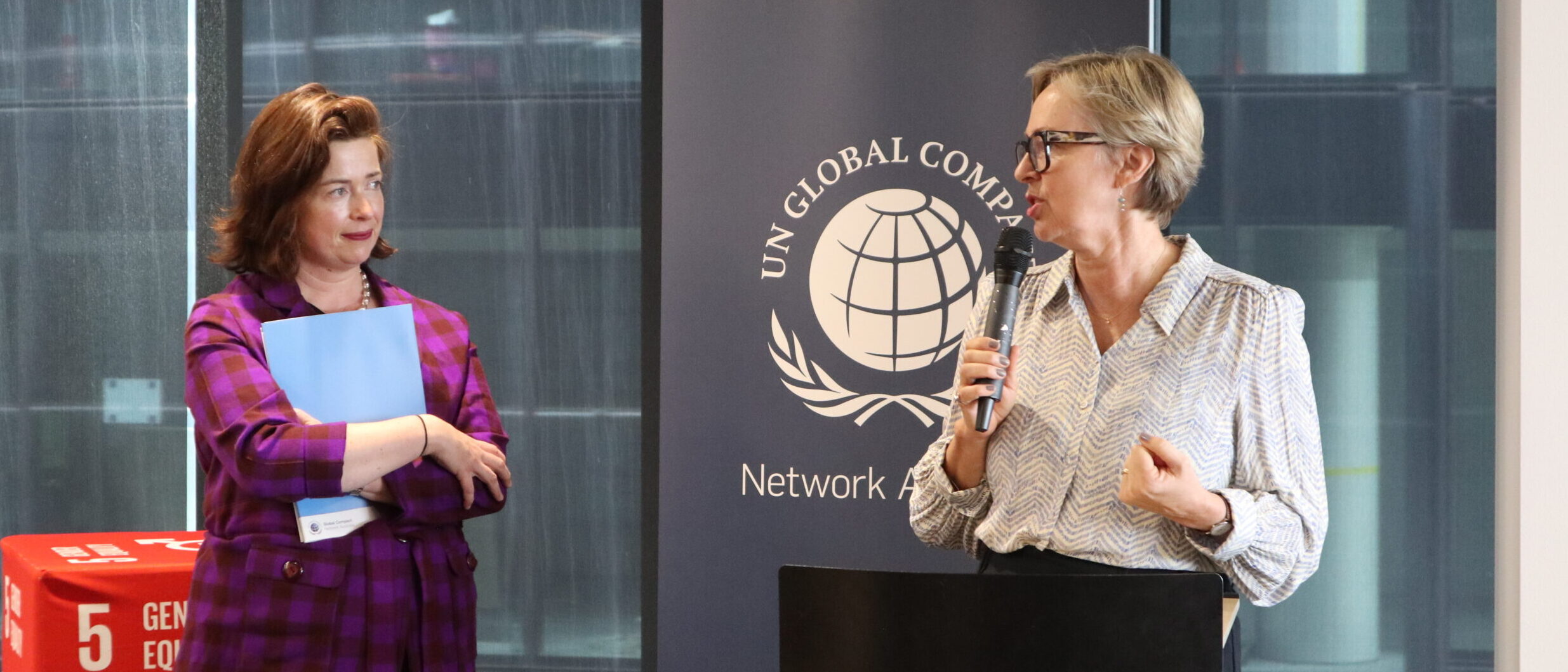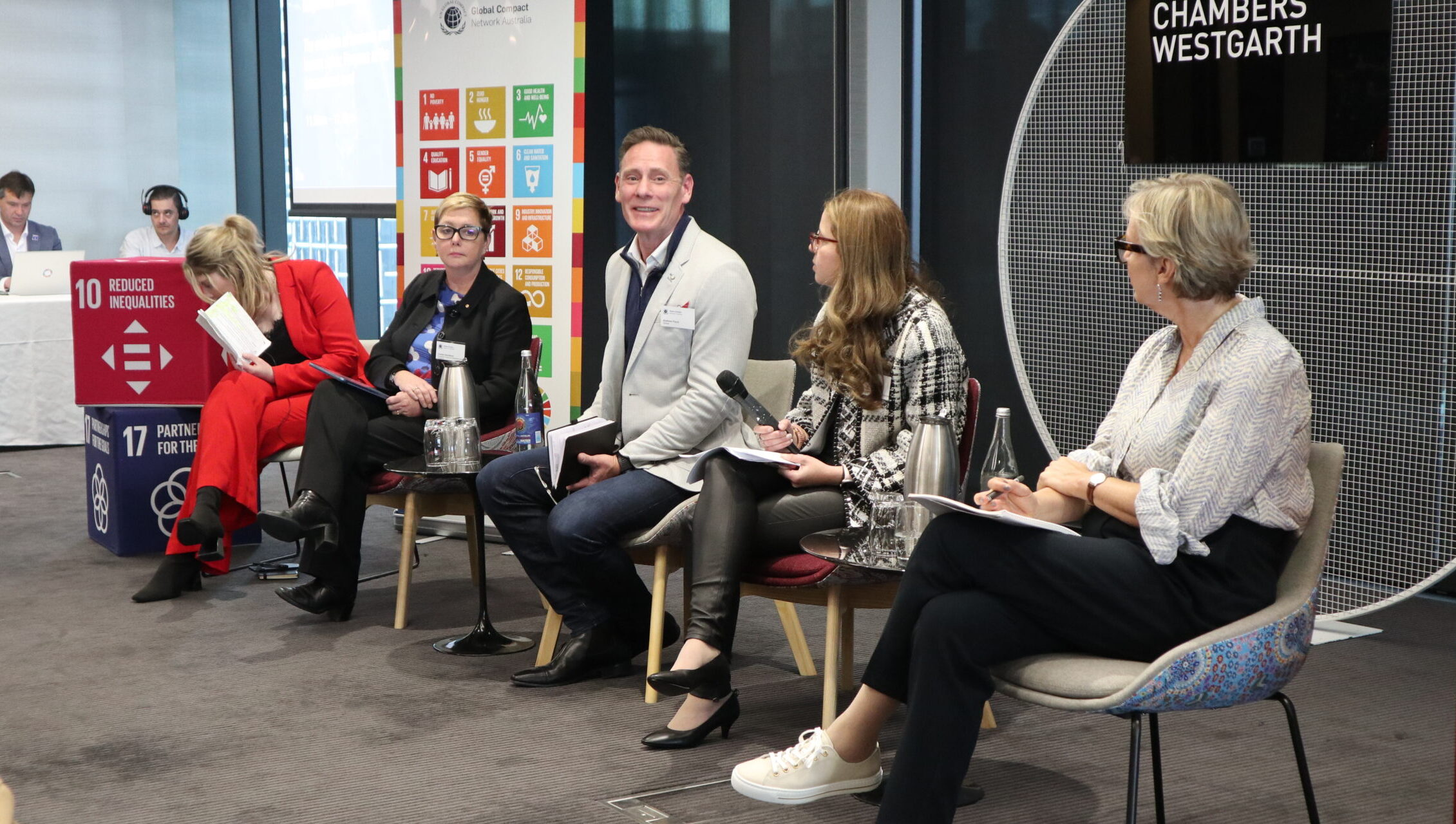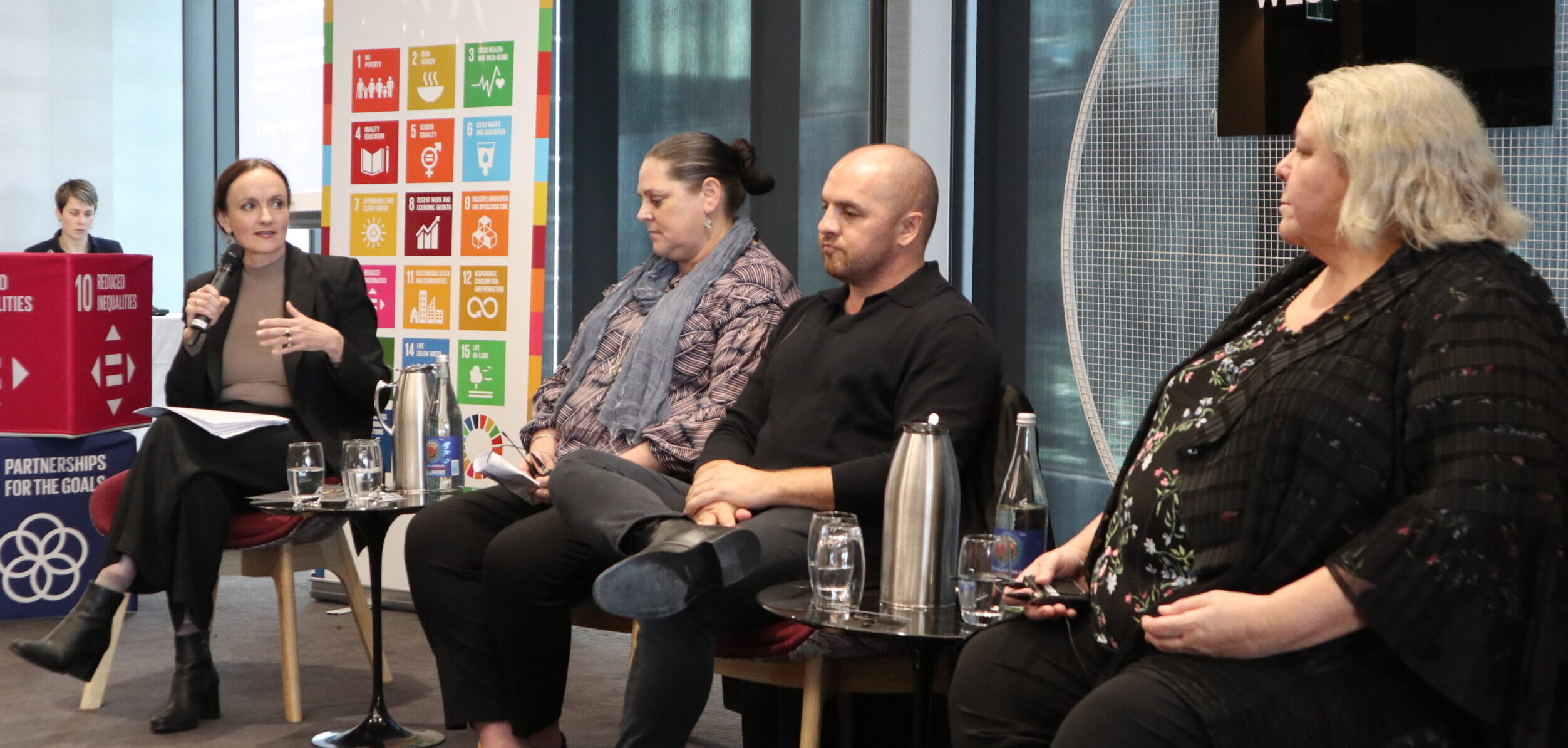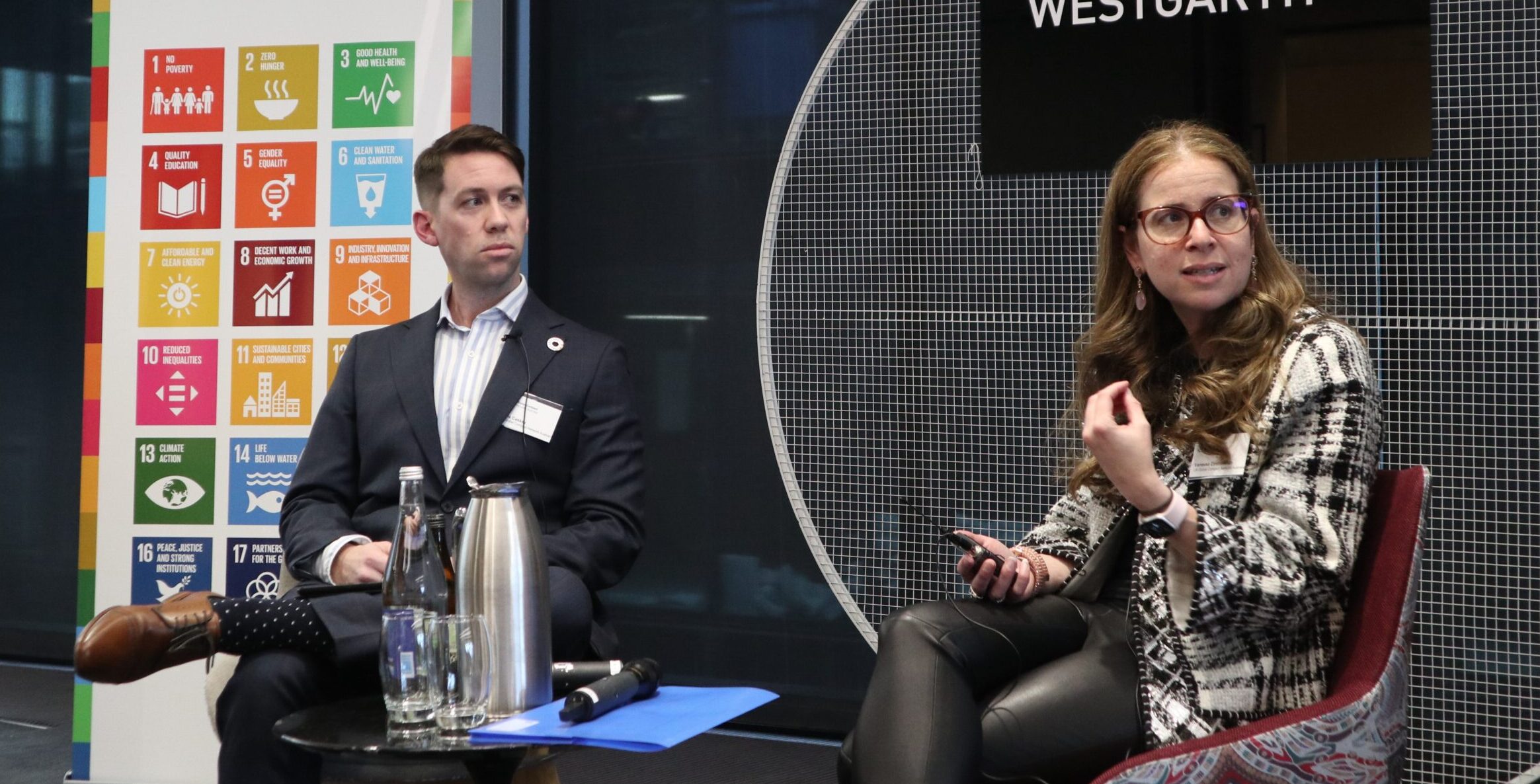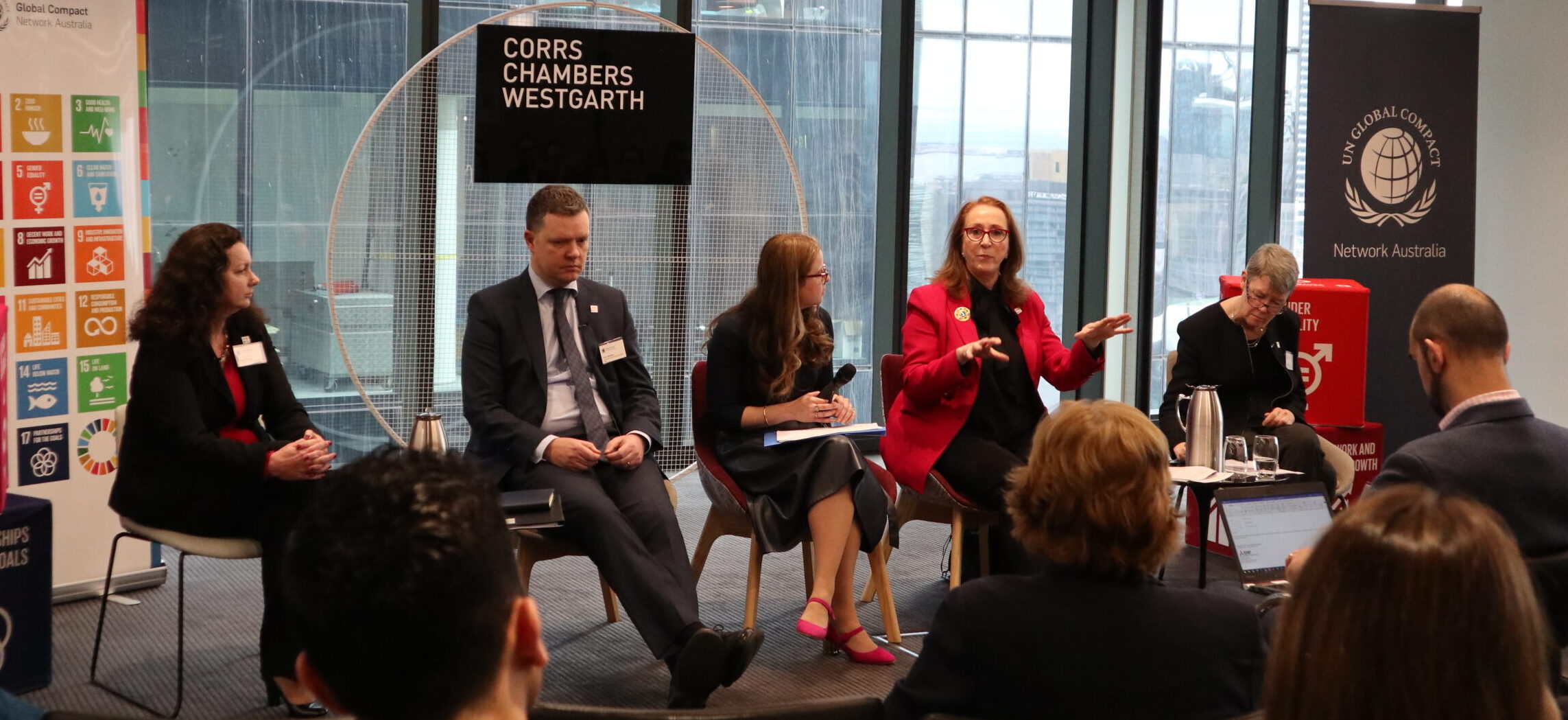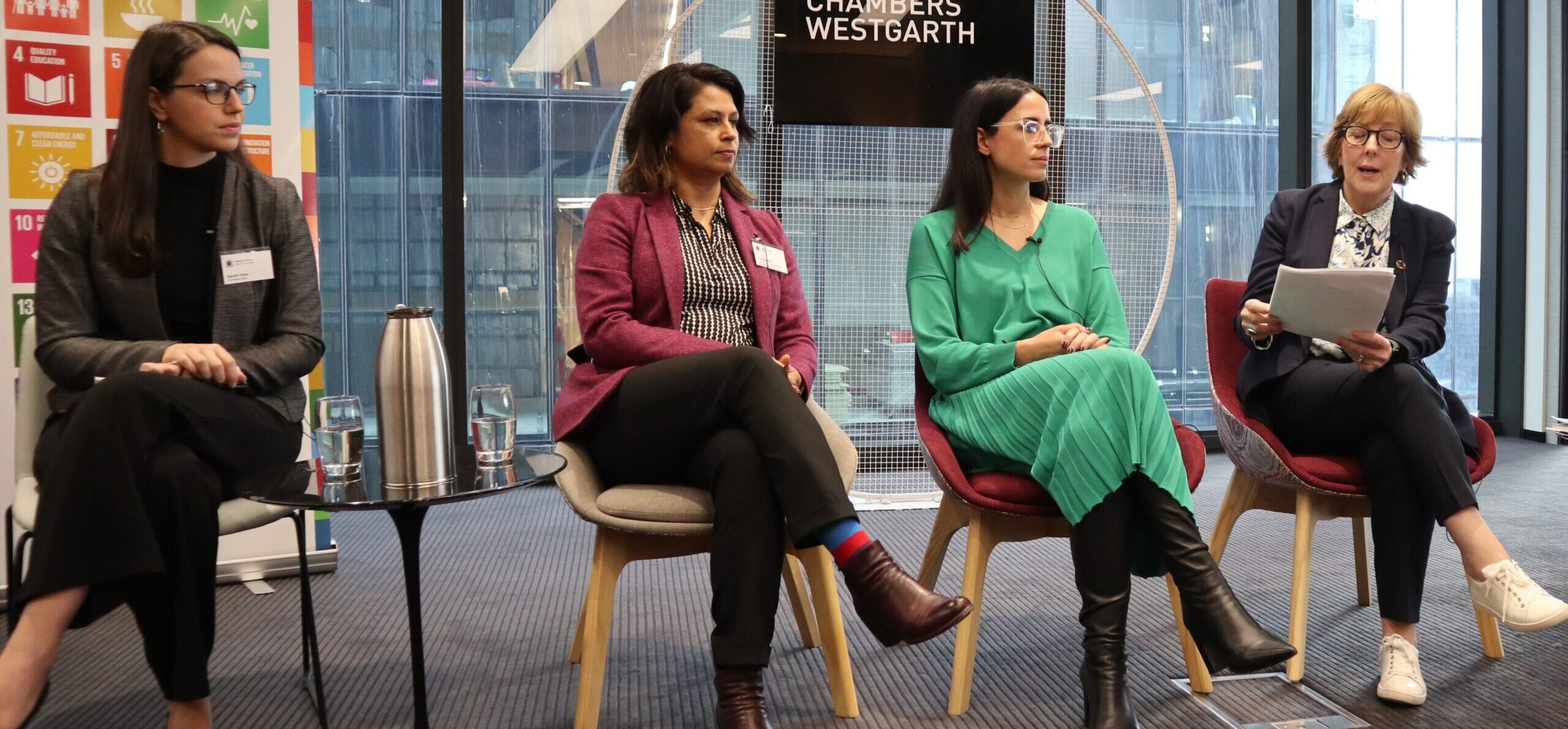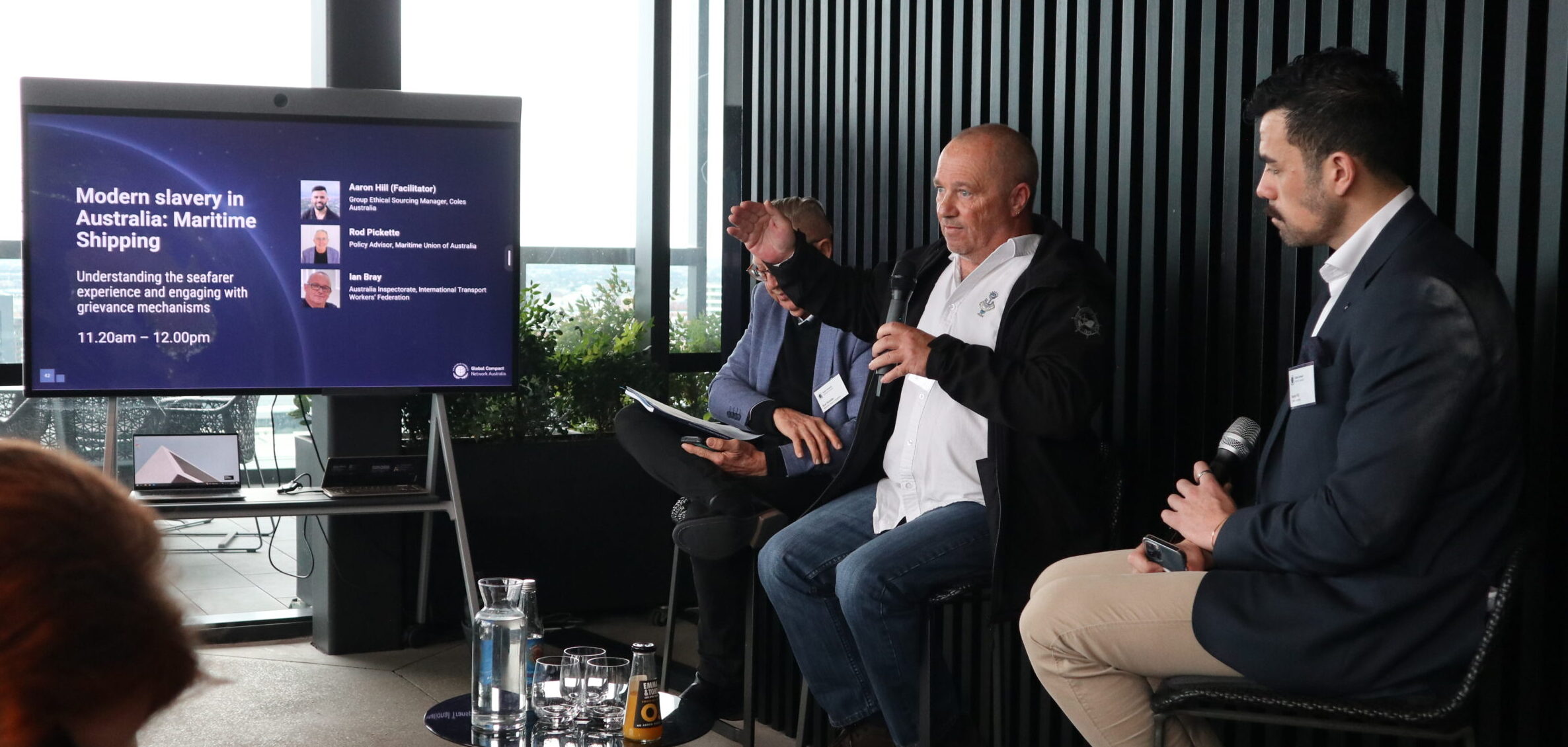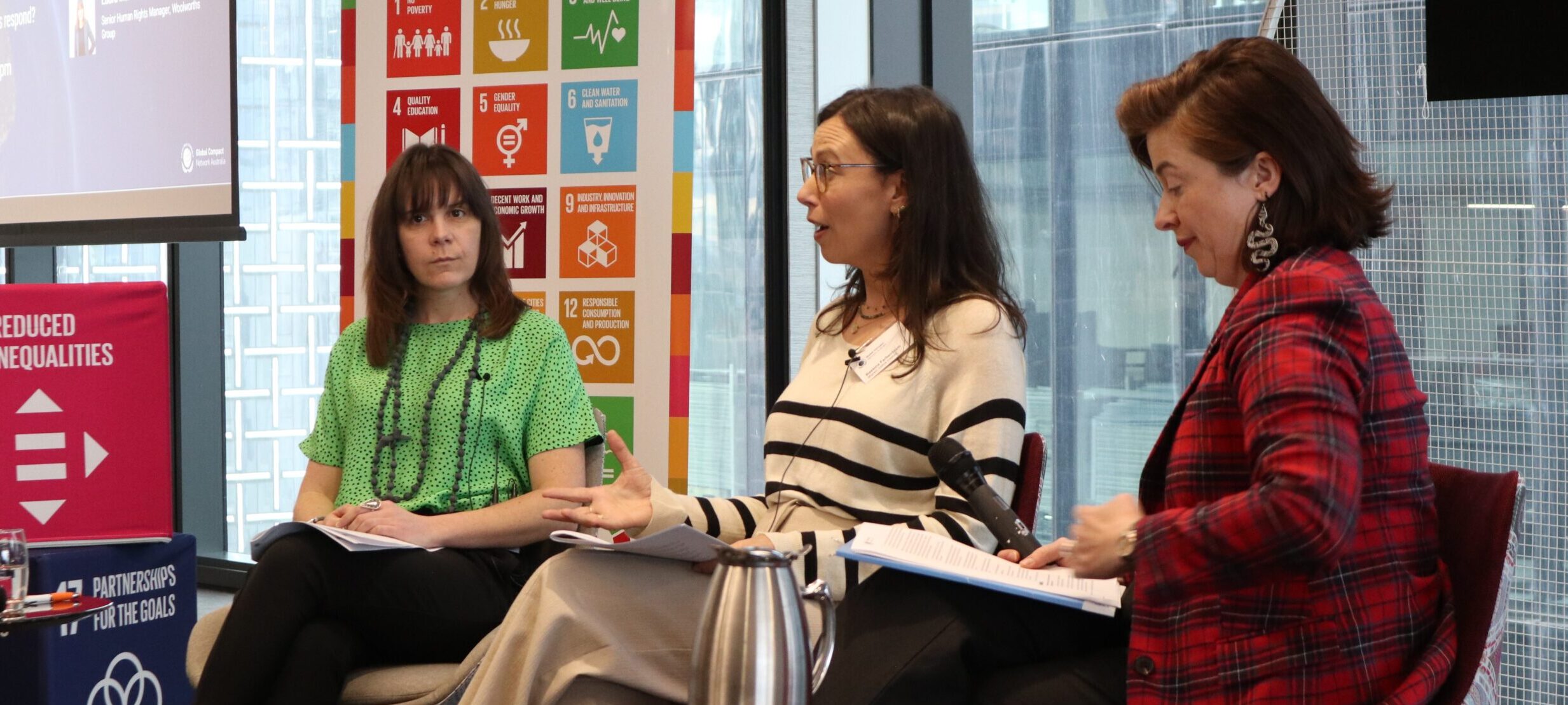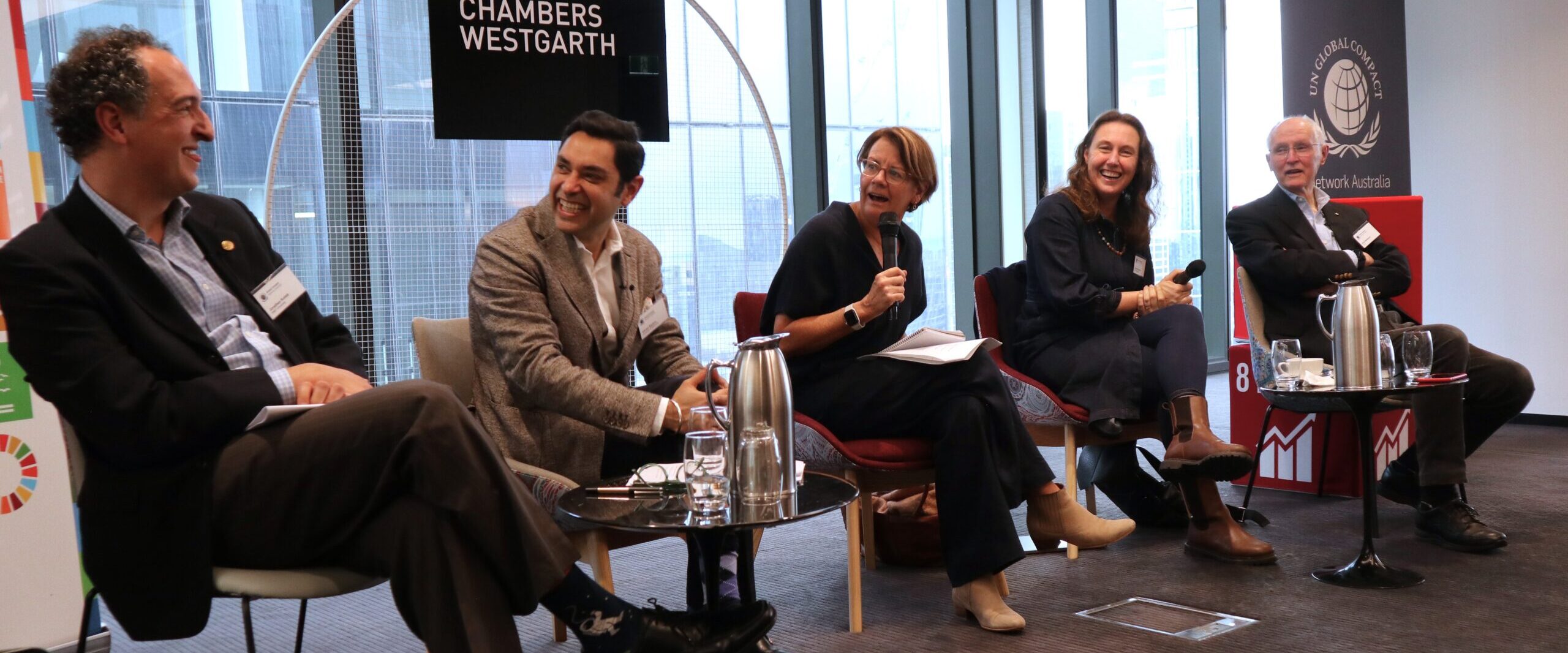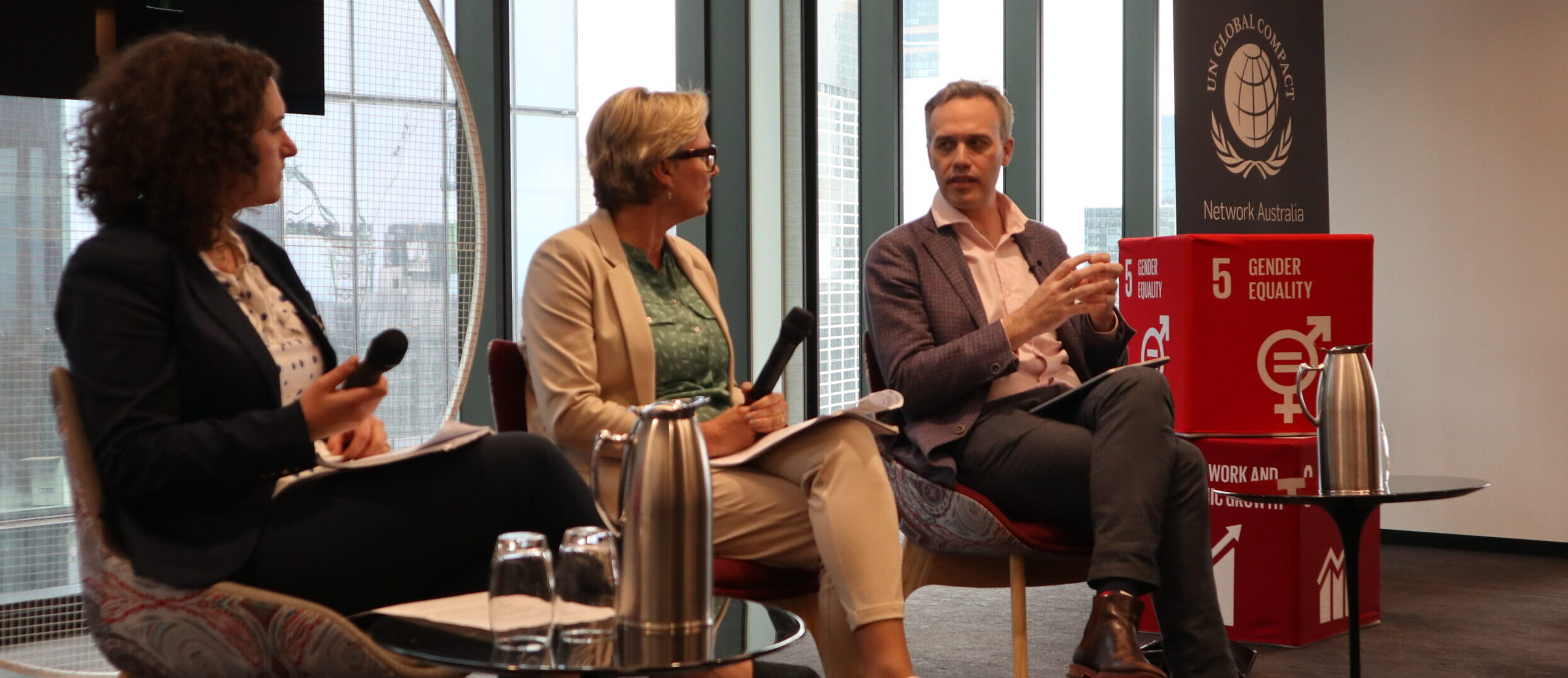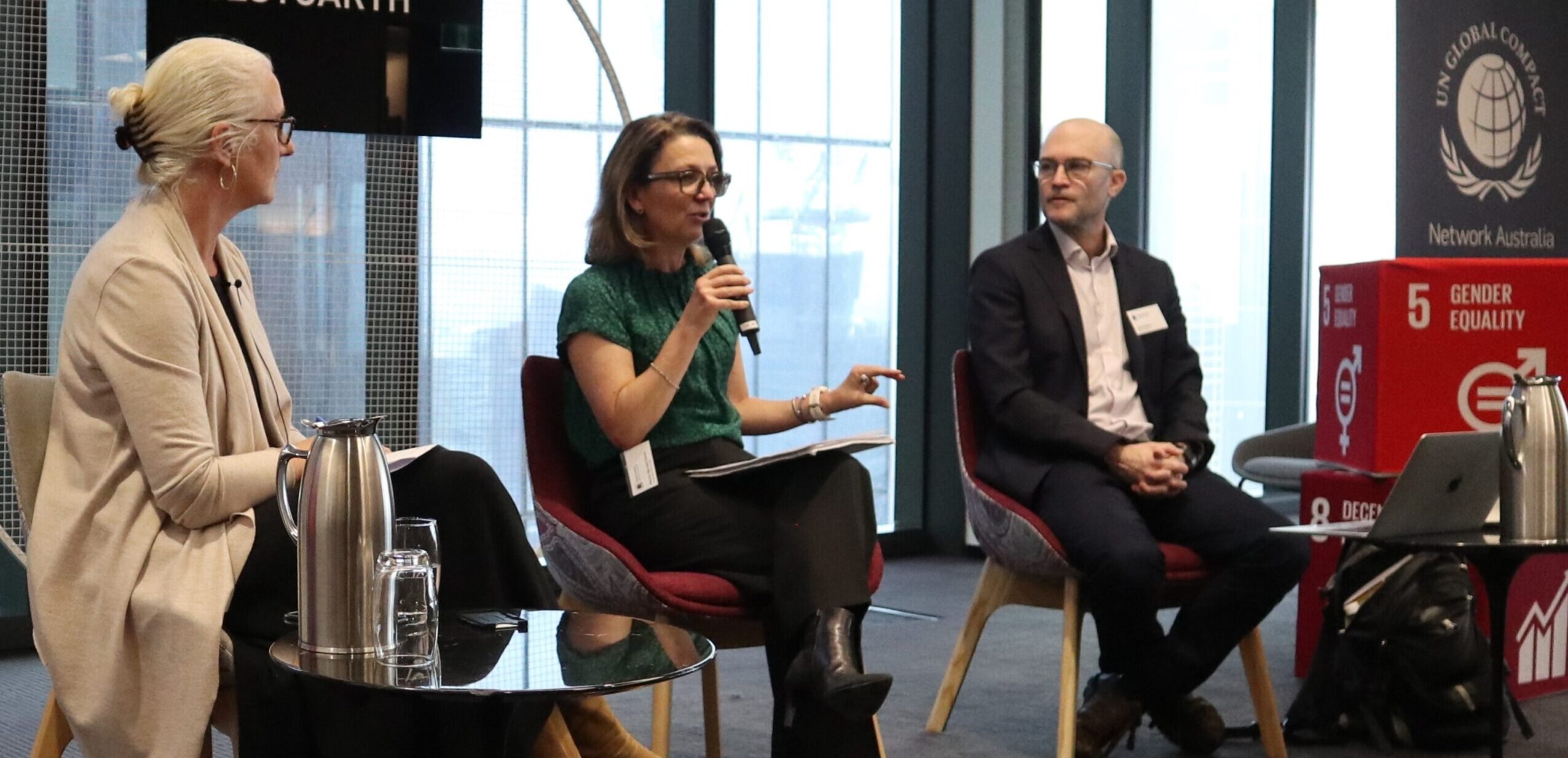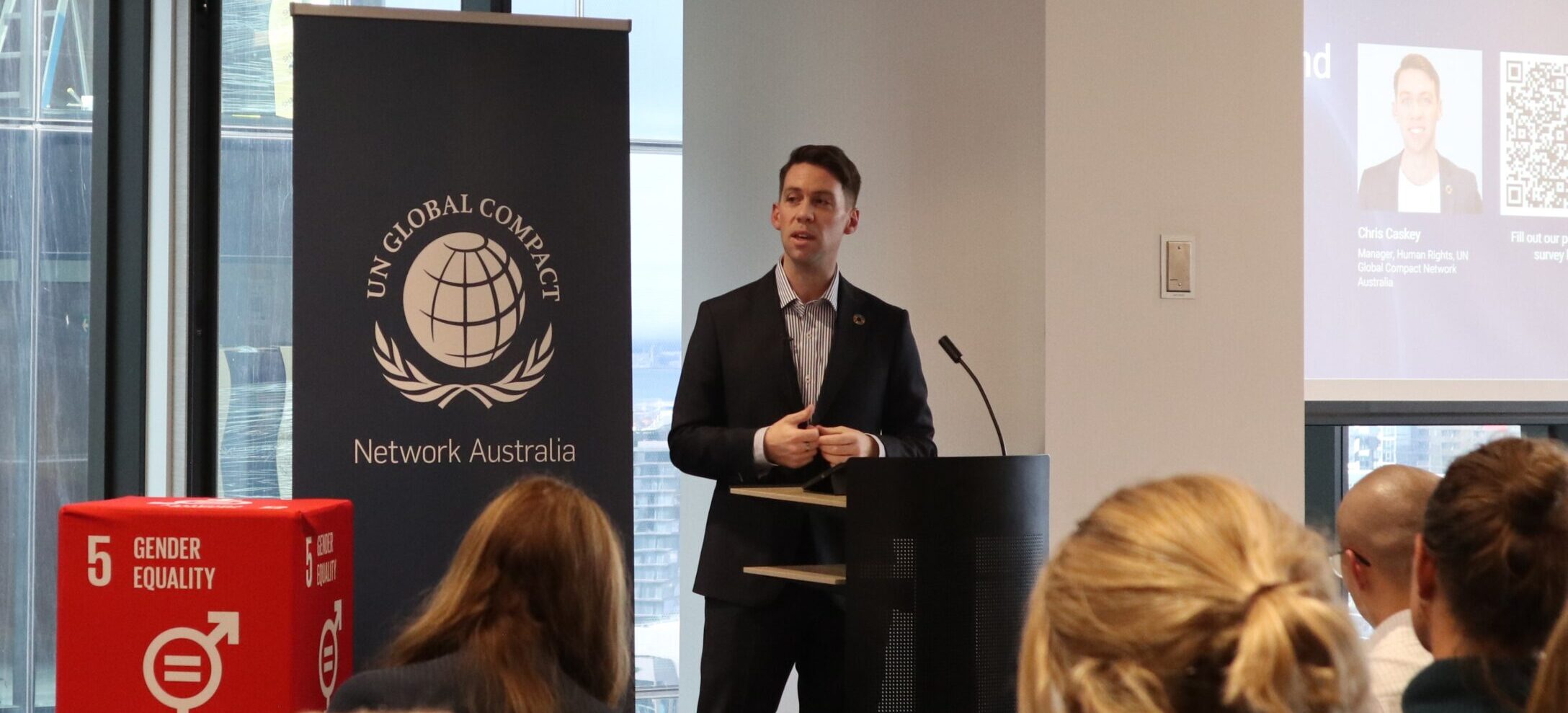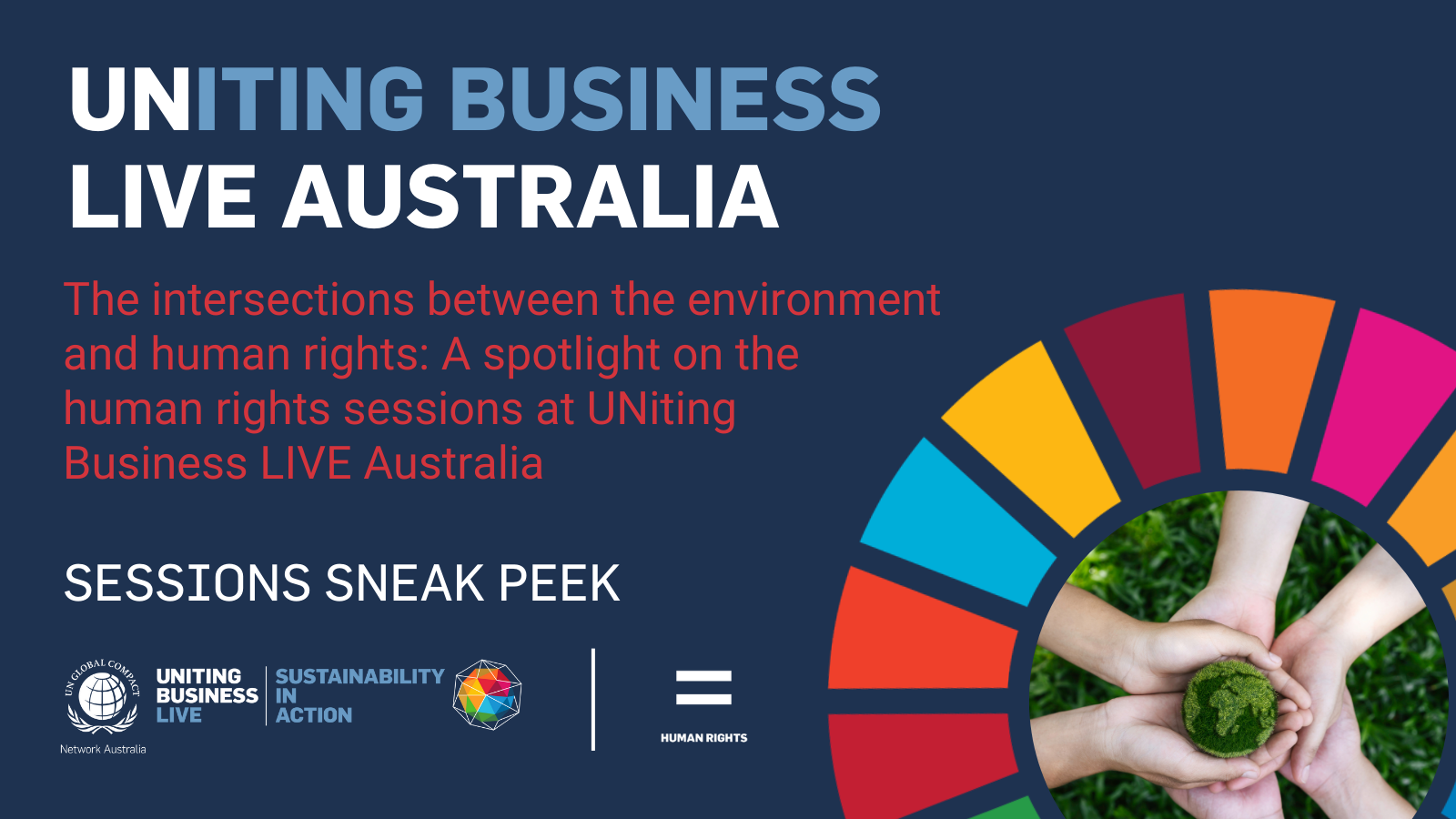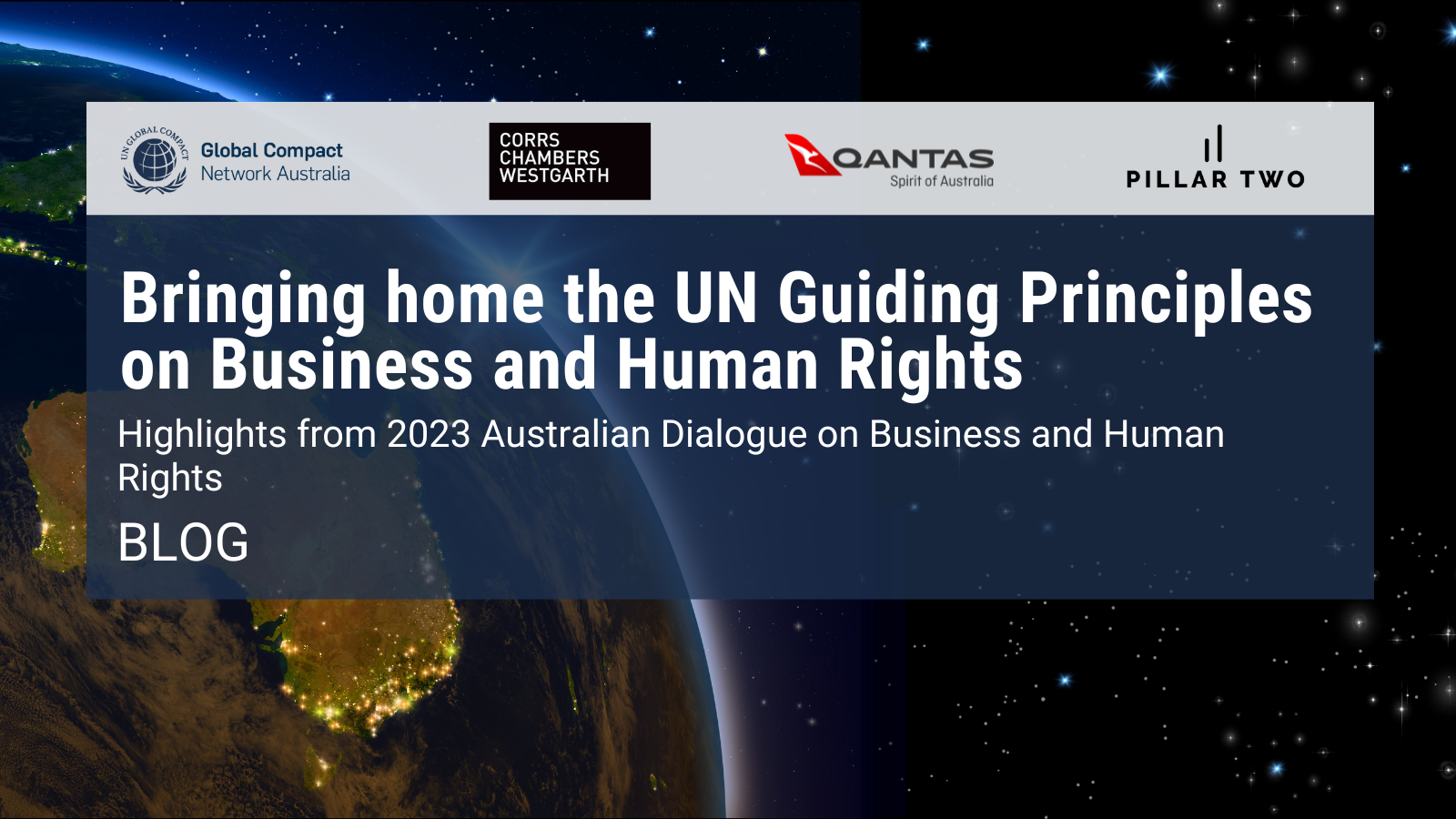
Blogs, Business & Human Rights, Featured, Media, News
BLOG | Bringing home the UN Guiding Principles on Business and Human Rights: Highlights from the 2023 Australian Dialogue on Business and Human Rights
Chris Caskey | September 18, 2023
Key Points:
- In August 2023, the UN Global Compact Network Australia (UNGCNA) convened 120 human rights practitioners, government, civil society and investor representatives to discuss advancing the business and human rights agenda in Australia.
- The theme of the 2023 Dialogue was Bringing home the UN Guiding Principles on Business and Human Rights: attendees discussed business and human rights trends at the international level, their impact on Australia, evolving stakeholder expectations and increasing regulatory scrutiny of performance on human rights and ESG issues.
- Panellists unpacked key business and human rights issues for Australian businesses in 2023 – such as the impact on First Nations colleagues and their families, protection of cultural heritage, respecting human rights through technological change, and much more. This blog contains our key insights from the 2023 Dialogue.
Photos: Access the full Photo Library from the 2023 Australian Dialogue on Business and Human Rights at the bottom of this post.
Blog
On 30 and 31 August 2023, the UN Global Compact Network Australia convened over 120 representatives from business, civil society, investor groups, government, and other stakeholders to discuss Bringing home the UN Guiding Principles on Business and Human Rights. Throughout the 1.5-day Dialogue, attendees discussed progress on integrating the UN Guiding Principles on Business and Human Rights (UNGPs) within Australia and explored shared challenges – such as the provision of an effective remedy, human rights in technology and engagement between rights-holders, civil society and business.
Kate Dundas, Executive Director, UN Global Compact Network Australia facilitates Q&A with Lene Wendland, Keynote speaker and Chief, Business and Human Rights at the Office of the High Commissioner for Human Rights, at the 2023 Australian Dialogue on Business and Human Rights.
- Key trend at the international level: emerging human rights due diligence legislation in numerous countries: Attendees noted that the emergence of human rights due diligence legislation in a number of key geographies including France, Germany, the Netherlands and Norway was beginning to raise the standard of responsible business conduct in a number of contexts – especially where companies have cross-border operations or partner with companies in other geographies. Attendees noted Australian companies have been increasingly expected to provide details of human rights due diligence undertaken over their operations and supply chains by various stakeholders – while this was previously common for modern slavery risks in order to avoid import and export issues (such as those driven by import bans), attendees noted that the due diligence focus is expanding – and that best practice human rights due diligence is increasingly becoming competitive.
Andrew Finch, General Counsel and Group Executive Office of the CEO, Qantas, addresses the audience at the 2023 Australian Dialogue on Business and Human Rights. Mr Finch is joined by Jessica Tinsley (left), Louise Davidson (centre-left), Vanessa Zimmerman (centre-right) and Lene Wendland (right).
Estelle Parker, Executive Manager, Responsible Investment Association Australasia addresses the audience at the 2023 Australian Dialogue on Business and Human Rights. Ms Parker is joined by Mel Sutton (centre left), Jamie Lowe (centre right), and Cath Brokenborough (right).
- Businesses need to do more to respect and protect the human rights of First Nations employees, their families and communities: Panellists noted that while many businesses in Australia have stepped up through the development of Reconciliation Action Plans (RAPs) and public positions on the First Nations Voice to Parliament, 2023 is a particularly difficult year for First Nations Australians. Businesses looking to engage on First Nations human rights issues should first engage with their First Nations team members, however need to bear in mind the cultural load placed on First Nations people in 2023 and develop adequate cultural safety and support mechanisms, for example the introduction of leave provisions. Panellists also noted that the use of hedge framing in public commitments – such as “endeavour to” or “work towards” was increasingly seen as unhelpful. Businesses wanting to take a First Nations led approach towards the protection of cultural heritage should engage with the Dhawura Ngilan (Remembering Country) Business and Investor Initiative.
Guidance Publication Launch: The Dhawura Ngilan Business and Investor Initiative, led by the First Nations Heritage Protection Alliance in partnership with the Responsible Investment Association Australasia and the UN Global Compact Network Australia, launched an early exposure draft of the Dhawura Ngilan Business Guide on 30 August. See full details of the launch and download the Business Guide here.
- Resource allocation remains a key blocker to effective action on human rights: While attendees agreed that lack of awareness on human rights harms in Australia and the alphabet soup of regulation were contributing factors, most agreed that the number one blocker to effective action on human rights is under-resourcing of human rights, modern slavery and broader supplier engagement teams. As the expectation that companies conduct effective human rights due diligence increases, senior leaders should view human rights practitioners as essential resources in ensuring that the organisation is aware of potential adverse human rights impacts.
- Australian businesses are beginning to broaden their due diligence beyond modern slavery: Panellists noted that while the Modern Slavery Act had driven a significant amount of human rights due diligence language into corporate Australia, businesses are now beginning to assess and address broader human rights issues – such as labour rights risks, respect for First Nations’ human rights and the right to privacy. However, without coordinating the approach internally, addressing broader risks in silos can lead to fragmentation within the business: for example, those responsible for different issues, risk and impact assessments, engagement with rights-holders and disclosure residing in different areas of the company. Panellists highlighted the importance of aligning the broader internal framework on business and human rights on the UN Guiding Principles, taking a risk-to-people approach, and ensuring that businesses are meeting their expected action based on their involvement with any identified harms.
Publication Launch: UN Global Compact Network Australia launched its latest research publication developed in partnership with Pillar Two titled Business integration of Human Rights Due Diligence in Australia: Modern Slavery and Beyond on 30 August. See full details of the launch and download the publication here.
Emeritus Professor Rosalind Croucher AM, President, Australian Human Rights Commission, addresses the audience at the 2023 Australian Dialogue on Business and Human Rights. Ms Croucher is joined by Frances Finney (left), Tom Dickson (centre left), Vanessa Zimmerman (centre), and Bronte Moules (right).
Fiona Reynolds, Chair, UN Global Compact Network Australia addresses the audience during the 2023 Australian Dialogue on Business and Human Rights. Ms Reyonds is joined by Sandra Silea (left), Shanta Martin (centre left), and Alexandra Banks (centre right).
- Increased scrutiny is leading to internal friction between human rights practitioners and broader legal and risk teams: Panellists noted that as expectations on ESG performance increases, heightened scrutiny from investors, civil society and regulators has led to internal legal and risk teams urging caution on ambitious human rights-related commitments. Attendees noted that instead of focussing on the framing of disclosure, the true measure is impact – and further, that embedding effective human rights due diligence processes within the business and engaging meaningfully with any potentially affected rights-holders or broader stakeholder groups is the best defence to claims of blue-washing.
Ian Bray, Australia Inspectorate, International Transport Workers’ Federation, addresses the audience during a Breakout Session at the 2023 Australian Dialogue on Business and Human Rights. Mr Bray is joined by Rod Pickette, Policy Advisor, Maritime Union of Australia (left) and Aaron Hill, Group Ethical Sourcing Manager, Coles (right).
- Modern slavery risks for seafarers remain hidden: While many Australian companies utilise maritime shipping to import or export goods, visibility of the modern slavery risks associated with the use of maritime shipping remains low and cargo owners need to exert more pressure on shipping suppliers to meet human rights standards. Panellists presented on various scenarios where shipping suppliers had fallen short on respecting seafarers’ rights, in particular, through the COVID-19 Crew Change crisis and through experiences highlighted by female seafarers, including sexual harassment and exploitation. Panellists noted that the experiences of seafarers are the responsibility of all involved in the value chain and that more needs to be done to create a safe, healthy and sustainable work environment for those at sea. For more information, view the UN Global Compact Network Australia and Maritime Union of Australia December 2022 publication, Modern Slavery within Maritime Shipping: Guidance for Australian Businesses in Identifying, Managing and Mitigating Modern Slavery Risks within Maritime Shipping.
Bassina Farbenblum, Associate Professor, Faculty of Law and Justice, UNSW and Executive Director, Migrant Justice Institute, addresses the audience during a Breakout Session at the 2023 Australian Dialogue on Business and Human Rights. Ms Farbenblum is joined by Laura McManus (left) and Kate Dundas (right).
- Without visa protections, grievance mechanisms don’t work for migrant workers: Panellists noted that as many as one million workers are employed as ‘guest’ or migrant workers within Australia at any one time, including many in low-pay and low-skilled roles, such as horticulture, abattoirs, hospitality, construction and commercial cleaning. While many Australian companies have established grievance mechanisms to provide workers a safe channel to report instances of labour exploitation, panellists noted that without visa protections, it still remains illogical for workers to risk their visa status and ongoing stay in Australia by raising their concerns. For more details on migrant workers in Australia, see our recent Bite-sized Learning, Modern Slavery and Migrant Workers in Australia.
Professor Justine Nolan, Director, Australian Human Rights Institute, UNSW addresses the audience during a debate on mandatory Human Rights Due Diligence at the 2023 Australian Dialogue on Business and Human Rights. Ms Nolan is joined by Jonathan Kolieb (left), Vikram Bhako (centre left), Shelley Marshall (centre right) and Paul Redmond (right).
- While the focus is on mandatory human rights due diligence legislation, there are many pathways to ensuring business accountability: At the 2023 Dialogue, the UN Global Compact Network Australia hosted an expert debate focussed on whether mandatory human rights due diligence was essential to ensure business accountability on human rights. Debaters highlighted a range of arguments for the affirmative and the negative – however attendees agreed that there are many pathways to improving business accountability, including amending the ASX Corporate Governance Principles and Recommendations, reforming directors’ duties and linking Government subsidies to human rights performance.
Ed Santow, Industry Professor and Director – Policy & Governance at the Human Technology Institute, UTS, addresses the audience during the 2023 Australian Dialogue on Business and Human Rights. Mr Santow is joined by Ella Serry (left) and Lene Wendland (centre).
- Respecting human rights through the use of emerging technologies is difficult, but challenges are not new: Attendees noted that while the pace of technological change has unlocked many benefits for humanity, human rights risks remain including risks to democracy through disinformation campaigns, risks. Panellists reiterated the need to have businesses assessing and addressing human rights issues which they may be causing, contributing to, or directly linked to through their operations or business relationships. Companies looking to improve their alignment with the UN Guiding Principles on Business and Human Rights through the development, deployment and use of technology can engage with the B-Tech Project, facilitated by the Office of the High Commissioner for Human Rights.
Natalie Maxwell-Davis, Senior Manager, Modern Slavery Prevention and Response at the Australian Red Cross, addresses the audience at the 2023 Australian Dialogue on Business and Human Rights. Ms Maxwell-Davis is joined by Phoebe Wynn-Pope (left) and Luke Fletcher (right).
- Effective engagement with rights-holders remains crucial: Panellists noted that while all elements of the UN Guiding Principles approach to human rights due diligence are important, the framework cannot function properly without meaningful, effective and on-going engagement with any potentially affected rightsholders. Attendees also discussed the ongoing relationship between civil society and businesses, noting that as expectations on ESG performance increase, supporting and engaging with civil society and worker representative organisations can give businesses a competitive advantage. In designing grievance mechanisms, businesses should aim to build trust with workers and representative organisations, and always mind that workers often have more to lose in raising a particular issue within their workplace.
Chris Caskey, Manager, Human Rights, at the UN Global Compact Network Australia provides closing remarks at the 2023 Australian Dialogue on Business and Human Rights.
The UN Global Compact Network Australia is proud to deliver Australia’s annual multi-sector and multi-stakeholder forum dedicated to advancing the business and human rights agenda. We would like to extend our thanks to all speakers and attendees for their attendance and engagement. The 2023 Dialogue was made possible by the kind support of Corrs Chambers Westgarth, Qantas and Pillar Two.
Photos
You can access photos from the 2023 Australian Dialogue on Business and Human Rights at the links below. Photos may be used without permission provided there is proper accreditation to UN Global Compact Network Australia.
